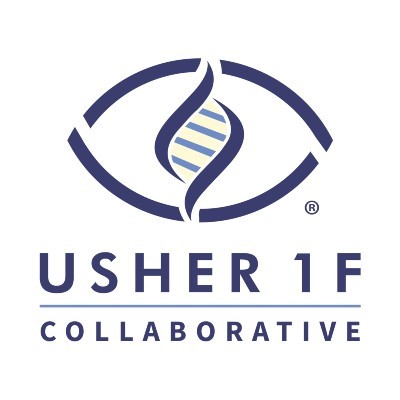Matti: Usher 1F in Germany
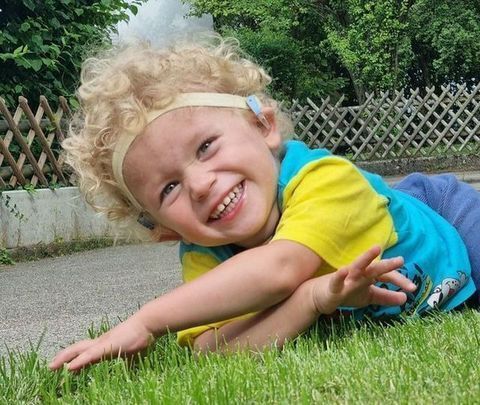
Hello, I’m Sabrina (43). I live with my children Neele (17), Lotta (15), and Matti (3) in Gäufelden, a small town in Baden-Württemberg, Germany. Matti is my third child and will turn 4 at the end of May. He’s a funny little guy with tons of energy—which sometimes pushes his older sisters to their limits.
I’ve been mostly on my own with the bunch for about a year-and-a-half now, since their dad and I separated. Did our very exhausting and emotional experiences contribute to that? No one really knows.
Matti was born on May 30, 2021, at the Herrenberg hospital, south of Stuttgart. His start in life was a bit rough. It was a difficult birth that ended in an emergency C-section, so his dad had to take care of him first until I was able to again. When the routine hearing screening was done, it repeatedly showed no results. But the nurses and doctors told us not to worry. Was it broken equipment, incorrect handling, or just a restless baby? No one could say.
We were discharged and advised to see a pediatric ENT, but they also couldn’t give us any answers. It didn’t feel right, so we looked for a specialist who fairly quickly diagnosed Matti with severe hearing loss. That was the first moment it felt like the ground had been ripped out from under our feet.
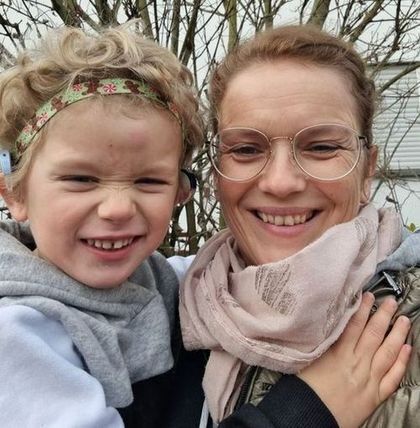
Matti and Sabrina
At six weeks old, Matti got his first hearing aids. But they never really fit properly, constantly whistled, and became a huge burden, especially since he didn’t really accept them. As we would later learn, it was because he wasn’t benefiting from them.
The audiologists always saw great reactions during the constant adjustments of the hearing aids. At first, we had to drive about an hour every week with the little one for appointments. But at home, we noticed no reactions. Nothing bothered him—not the doorbell, not the vacuum cleaner, not a door slamming shut due to a draft.
Fortunately, we were referred to the Olgahospital in Stuttgart. More tests were ordered. A hearing test under general anesthesia, called a BERA, brought a sobering result. Matti’s auditory nerve doesn’t respond. The measurements were stopped at 100 dB. Our child is deaf.
Pretty quickly, we began talking about the possibility of cochlear implants. I still hoped it was all just a big mistake.
So, the first surgery was at 11 months, the second shortly after his first birthday. Everything went well. The wounds healed nicely. He accepted the devices, and we thought we were on a good path.
We were told we could do a genetic test to find out why Matti is deaf, if we wanted to. We quickly decided that we did want to know the cause—with all the consequences. Or so we thought.
The genetic test was ordered, and just before Christmas 2022, we were invited to the clinic for a discussion. We went to the clinic totally naïve, thinking we’d just get the result and then head to the Christmas market with the whole family. It was practically around the corner.
But in the hallway, I already knew something wasn’t right. We could see into the geneticist’s office as he read our file. His body language didn’t look promising—and I was right.
Inside, they explained that they had found a genetic defect, passed down 50% from me and 50% from his dad. Matti has Usher syndrome.
Now the condition had a name. But what did that mean for us? Matti will go blind—likely in his childhood. He has one of the most aggressive forms of Usher syndrome: Type 1F.
Our world collapsed. It was the worst day of my life. You go numb from pain and uncertainty. Your heart just breaks for this little guy.
No one can imagine what it’s like unless they’ve been in this situation themselves. Your child’s future is essentially written, and you have no say in it. “Helpless” doesn’t even come close to describing it. You feel punished. You were handling the deafness well—why this too?
Strangely enough, I had seen something about Usher syndrome years ago and was horrified by it. How can it be? Deaf and blind? What a terrible combination.
Will my child be able to lead an independent life? When will the vision problems start? Will he need to go to a special needs school?
All we can do is prepare our little one as best we can. Lots of normalcy, outings, fun, toddler gymnastics, goofing around—combined with the necessities of our new daily routine: physical therapy, occupational therapy, speech therapy, eye doctor appointments, hearing aid adjustments at the hospital, rehab stays, and more.
Matti has shown me that life is absolutely worth living, even with limitations.Right now, we’re lucky that he has his balance issues well under control.He goes to a forest kindergarten with 20 kids. His needs are lovingly addressed.Our next step is school enrollment—hopefully still without vision impairment.
Because of Matti, I’ve become active in fundraising for research on Usher syndrome. It’s a way for me to cope with the diagnosis. You don’t feel helpless anymore. You’re doing something.
We remain positive. Matti is the sunshine of our family.
And the hope for a treatment for Usher syndrome is strong.
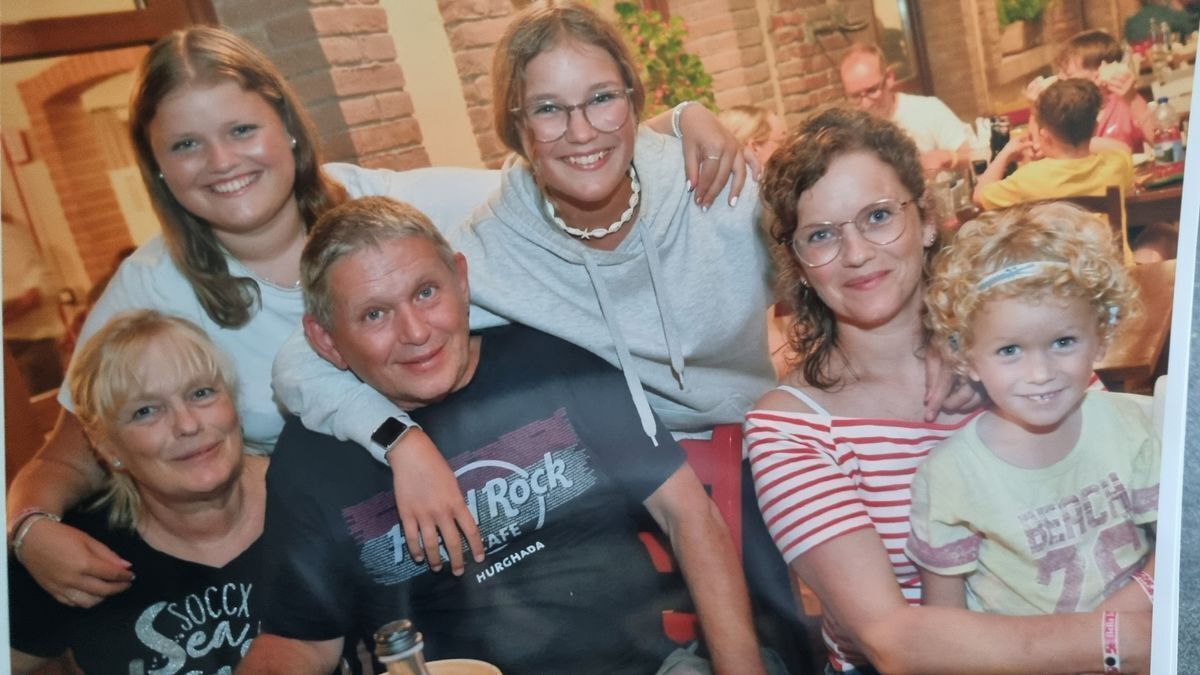
Matti and Sabrina with their family
Lernen Sie Matti kennen
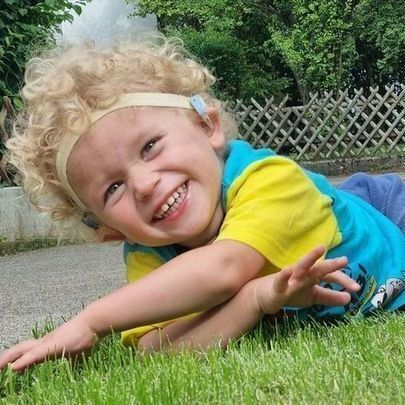
Hallo, ich bin Sabrina(43). Ich wohne mit meinen Kindern Neele(17), Lotta(15) und Matti(3) in Gäufelden, einem kleinen Ort in Baden-Württemberg(Deutschland).
Matti ist mein 3. Kind und wird Ende Mai 4 Jahre alt. Er ist ein lustiges kleines Kerlchen mit ganz viel Energie.
Was auch seine großen Schwestern manchmal an ihre Grenzen bringt.
Seit 1,5 Jahren bin ich jetzt größtenteils allein für die Rasselbande zuständig, weil der Papa und ich uns getrennt haben.
Ob unsere sehr anstrengenden und emotionalen Erlebnisse dazu beigetragen haben? Man weis es nicht.
Matti wurde am 30.05.2021 im Krankenhaus Herrenberg, südlich von Stuttgart geboren.
Sein Start ins Leben begann etwas holprig. Es war eine schwere Geburt mit einem Notkaiserschnitt, sodass der Papa als erstes für ihn sorgen musste, bevor auch ich wieder einsatzfähig war.
Als das Hörscreening routinemäßig durchgeführt wurde, gab es mehrfach keine Ergebnisse. Aber wir sollten uns keine Sorgen machen sagten die Schwestern und Ärzte.
Waren es kaputte Geräte, falsche Handhabung oder ein unruhiges Kind. Man konnte es uns nicht sagen.
Wir wurden entlassen und gebeten einen Kinderohrenarzt aufzusuchen, der uns dann aber auch keine Ergebnisse präsentieren konnte.
Da sich das alles nicht zielführend anfühlte, suchten wir einen Spezialisten, welcher uns relativ zügig eine hochgradige Schwerhörigkeit diagnostizierte.
Das ist der erste Moment wo man einfach das Gefühl hat, den Boden unter den Füßen weggerissen zu bekommen.
Mit 6 Wochen bekam Matti dann schon seine ersten Hörgeräte. Diese haben aber nie richtig gepasst, immer gepfiffen und uns ziemlich belastet,
da er sie auch nicht wirklich angenommen hat. Das war einfach, weil er davon nicht profitierte, wie sich später rausstellen sollte.
Die Akustiker haben immer tolle Reaktionen gesehen währen der ständigen Anpassungen der Hörgeräte.
Jede Woche mussten wir anfangs ca. 1 Stunde mit dem kleinen dorthin fahren.
Wenn wir dann aber zu Hause waren, haben wir keine Reaktionen feststellen können.
Es störte ihn einfach nichts. Nicht die Hausklingel, nicht der Staubsauger, nicht die zufallende Tür weil es Durchzug gab.
Glücklicherweise wurden wir an das Olgahospital in Stuttgart weiter geleitet.
Dort wurden weitere Untersuchungen angewiesen. Ein Hörtest unter Vollnarkose namens BERA brachte dann die ernüchternde Realität.
Mattis Hörnerv reagiert nicht. Bei 100db wurden die Messungen eingestellt. Unser Kind ist taub.
Relativ zügig wurden Gespräche geführt über die Möglichkeit Cochlea Implantate zu bekommen. Ich habe noch immer gehofft, dass es ein großer Irrtum ist.

Matti and Sabrina
Somit haben wir die erste OP dann erst mit 11 Monaten gehabt, die zweite dann nach seinem 1. Geburtstag.
Alles lief gut. Die Wunden verheilten gut. Er nahm die Geräte gut an und wir haben gedacht wir sind auf einem guten Weg.
Man erklärte uns, dass wir, wenn wir möchten, eine genetische Untersuchung machen könnten, um herauszufinden, warum Matti gehörlos ist.
Uns war ganz schnell klar, dass wir die Ursache wissen möchten, mit allen Konsequenzen. Dachten wir...
So wurde die Genuntersuchung angewiesen und kurz vor Weihnachten im Jahr 2022 wurden wir in die Klinik zum Gespräch eingeladen.
Völlig blauäugig sind wir in die Klinik gefahren. Wir wollten nur kurz das Ergebnis holen und dann mit der ganzen Familie auf den Weihnachtsmarkt.
Der war sozusagen um die Ecke.
Nur auf dem Flur wurde mir schon klar, das etwas nicht stimmte. Wir konnten in das Zimmer des Humangenetikers schauen, als er unsere Akte las.
Seine Körpersprache verriet nichts Gutes. Und ich sollte recht behalten.
Im Zimmer wurde uns dann erläutert, dass man einen Gendefekt finden konnte. der 50%von mir und 50% vom Papa vererbt wurde.
Matti Hat das Usher-Syndrom.
Das Kind hat einen Namen. Aber was bedeutet das für uns?
Matti wird blind werden und das wohl noch in seiner Kindheit.
Denn er hat eine der aggressivsten Formen des Usher-Syndroms. Er hat 1F.
Eine Welt bricht für uns zusammen. Der Schlimmste Tag in meinem Leben. Man ist taub vor Schmerz und Ungewissheit.
Es tut einem einfach so unfassbar leid für das kleine Würmchen.
So etwas kann sich niemand vorstellen, der nicht selbst in dieser Situation einmal war. Die Zukunft für dein Kind ist geschrieben und du hast keinen Einfluss darauf.
Da ist Hilflosigkeit ein wirklich nicht ausreichender Begriff. Man fühlt sich wie bestraft. Man hat die Taubheit gut im Griff. Warum denn jetzt auch noch das.
Kurioser weise habe ich Jahre zuvor etwas über das Usher-Syndrom gesehen und war einfach nur fassungslos. Wie kann das sein? Taub und Blind. Was für eine schreckliche Kombination.
Wird mein Kind ein eigenständiges Leben führen können?
Wann wird es mit Seheinschränkungen zu kämpfen haben?
Wird es in eine Sonderschule gehen müssen?
Alles was wir machen können, ist unseren Kleinen soweit es geht gut vorzubereiten.
Viel Normalität, Ausflüge, Spaß, Kinderturnen, rumalbern, gepaart mit den Notwendigkeiten unseres neuen Alltags wie Physiotherapie, Ergotherapie, Logopädie, Augenarzt, Anpassungstermine im Krankenhaus, Reha-Aufenthalte und einiges mehr.
Matti hat mir gezeigt, dass das Leben sehr wohl lebenswert ist, auch mit Einschränkungen.
Momentan können wir nur von Glück reden, dass er seine Gleichgewichtsprobleme gut im Griff hat. Er besucht einen Waldkindergarten mit 20 Kindern. Auf seine Bedürfnisse wird liebevoll eingegangen. Unser nächster Schritt wäre die Einschulung. Welche hoffentlich noch ohne Seheinschränkungen stattfinden kann.
Durch Matti bin ich aktiv geworden, Spenden zu sammeln, welche der Forschung am Usher-Syndrom helfen sollen.
Es ist eine Art Bewältigung der Diagnose für mich.
Man fühlt sich nicht mehr Hilflos. Man schafft etwas.
Wir bleiben Positiv.
Matti ist der Sonnenschein der Familie.
Und die Hoffnung auf Behandlung für das Usher-Syndrom ist groß.

Matti and Sabrina with their family
